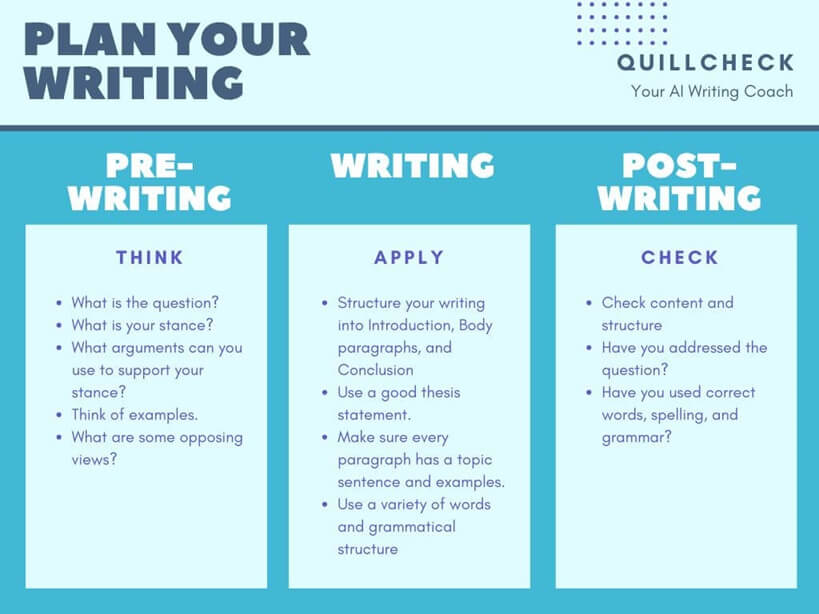Introduction
“If you don’t have time to read, you don’t have the time (or the tools) to write. Simple as that.”
Stephen King
Ready to write a winning essay? This guide will walk you through the entire process, from pre-writing to polishing your final draft. Let’s tackle each stage and turn essay anxiety into essay mastery!
NOTE: If you want a more comprehensive guide, I have published my book for free: READ HERE.

Pre-writing stage
1. What is the question?
- Read the prompt carefully. Identify the topic and the specific instructions. Are you asked to argue for one side or can you choose?
- Underline key terms like “should,” “argue,” or “advantages/disadvantages.”
2. Craft a Strong Thesis Statement:
- Your thesis is a single sentence that summarizes your main argument.
- It should be clear, concise, and directly address the prompt.
- Example Prompt: “Should social media platforms be held accountable for the spread of misinformation?”
- Example Thesis: “Social media platforms should be held accountable for the spread of misinformation because they have a responsibility to promote truth and prevent harm.”
3. Build Your Arguments:
- Brainstorm reasons to support your thesis. Aim for 2-3 strong arguments.
- Use evidence to back up your arguments. This can include facts, statistics, quotes from experts, or personal anecdotes (if relevant).
4. Acknowledge Opposing Views:
- Show your essay is well-rounded by acknowledging potential counterarguments to your position.
- Briefly explain the opposing viewpoint, then explain why your argument is stronger.
Writing Stage
1. Structure Your Essay:
- Introduction: Briefly introduce the topic, state your thesis, provide background information (optional) or an outline.
- Body Paragraphs: Each paragraph should focus on one argument. Start with a topic sentence that connects back to your thesis. Then, present your argument, evidence, and rebuttal of any counterargument related to that point.
- Conclusion: Restate your thesis in a new way, summarize your main points, and leave a lasting impression.
2. Use Strong Language:
- Write in clear and concise language that is easy to understand.
- Use varied vocabulary that demonstrates your knowledge of the topic.
- Proofread carefully for grammar and punctuation errors.
Bonus Tip:
- Use transitions effectively to connect your ideas and improve essay flow.
Post-writing Stage
1. Check Content and Structure:
- Does your thesis statement accurately reflect your arguments?
- Is your essay well-organized with a clear flow of ideas?
- Are your arguments well-developed and supported with strong evidence?
- Did you acknowledge and address opposing viewpoints effectively?
2. Polish Your Language:
- Can you replace any repetitive words with more precise vocabulary?
- Are your sentences clear and concise?
- Can you vary your sentence structure for better readability?
Conclusion
- Follow the specific instructions of the prompt.
- Focus on a clear and logical argument.
- Use strong evidence and address counterarguments.
- Write with clarity and organization.
By following these steps, you’ll be well on your way to writing a high-scoring argumentative essay for your exam!
